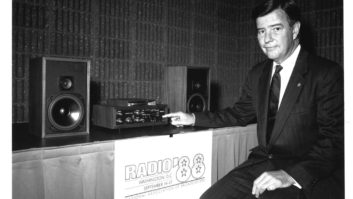John Hogan Says Radio People Characteristically Focus on Market Share When There’s a Broader Picture to Consider
Has Clear Channel thrown in the towel when it comes to dominating local market revenues? Not exactly.
Yes, the radio group has suffered a succession of quarters in which revenues lagged behind the industry as a whole. And yes, it has dumped out of some big — ticket sports broadcasting arrangements and non — traditional revenue events.
But given up? No way. What it has done is as basic as Business 101. They are simply getting out of many situations in which the return on investment was not as high as they would prefer.
Big changes
Clear Channel Radio has undergone tectonic changes in the past year. The division has reorganized twice, most recently in August when it realigned its radio regions and added three new senior vice presidents.
A year earlier, the group had undergone a radical makeover, which included the replacement of CEO Randy Michaels with then-COO John Hogan. It was that change in command that inaugurated movement in the group’s operating philosophy and focus.
Hogan, a 20 — plus — year veteran of radio sales, came to Clear Channel in the 1999 Jacor Communications acquisition. In August 2001, he was promoted from senior vice president to chief operating officer and soon began beefing up the radio sales group. Within two months of his appointment as COO, he brought on 500 new sales executives.
Things aren’t exactly bleak. In 2002, the radio group accounted for $3.5 billion in gross billings, taking the industry’s biggest piece of the money pie. But Hogan is not singularly focused on maintaining its leading position in the race for revenues. He wants his market managers to evaluate their revenue opportunities, then select those that provide the highest return on the investment.
Simply put, he wants more profitability.
Hogan says radio people characteristically focus on market share when there’s a broader picture to consider.
“We think market share is important, but it’s not nearly as important to us and to our shareholders as profitability. We pay very close attention to all the expenses associated with generating new revenues. It doesn’t help us to increase our market share but to simply maintain or, even worse, diminish the profitability of the company.
“What we’ve done is made conscious decisions to move away from some revenue streams that were less profitable for us and replace them with more profitable revenue streams.”
Hogan offers station managers a powerful incentive to find and develop these new profitable revenue streams: the managers’ compensation is pegged to profitability, not ratings.
“Ratings are incredibly important to us; but they’re important to us in terms of being a means for achieving greater profit. Our managers understand that the end game for them is to do the very best radio they can do for their local markets, to be as connected as they can to their local audiences so that we have the greatest number of listeners.
“Then they have to convert those listeners into opportunities for their local advertisers, and to get as many advertisers as possible accessing those local listeners, and do it in as efficient a way possible. That will lead to increased profits and we reward them very handsomely for that.”
Not “Cheap Channel”
According to Hogan, one of the misperceptions is that the company won’t spend a dollar to earn $10, giving rise to the unflattering moniker “Cheap Channel.”
“I’ve been with the company almost five years and I can tell you nothing is further from the truth. We will spend money to make money,” he said. “There is absolutely no hesitation to spend a dollar, or a hundred dollars, or a hundred thousand dollars if there is a reasonable and attractive return on the investment.”
While Hogan says Clear Channel won’t hesitate to spend money where merited, he says that it also will not balk at cutting out long-standing practices that don’t deliver enough return.
Two areas that have come under particular scrutiny are sports broadcasts rights and non-traditional revenue events. The highest-profile example of the former was a decision earlier this year not to continue radio broadcasts of Los Angeles Dodgers baseball on KXTA(AM).
“We carried the Dodgers on our stations in Los Angeles for years and paid a multimillion-dollar rights fee for that,” Hogan said.
“But at the end of the day, we determined that the amount of profit we could get selling Dodgers was dwarfed by what we could get by simply selling that time in other ways to different people. So we disconnected from the Dodgers. Our revenue share will be down, but our profitability will be up.”
Clear Channel Radio has done the same sort of analysis with NTR.
In 2002, the company did an event in Atlanta where it generated $300,000 in revenue, but also generated $300,000 in expenses. That event is just one of literally hundreds of NTR events across the country that Clear Channel did last year that are not being done this year.
“Our managers understand that if you have to spend $100 to make $100 in revenue, that’s not a great business formula,” Hogan said. “So we’re asking them to make sure that they’re focusing on the most profitable revenue streams, not just on market share.”
Immediate impact
The approach appears to have had an immediate impact on Clear Channel’s financials – and, at a quick glance, that impact would appear to be negative.
William Blair & Company, an investment house that covers Clear Channel (and does business with the company as well), reports that the rest of the industry outperformed Clear Channel Radio in revenue generation for the past three quarters.
But Blair analyst Alissa Goldwasser attributes a large part of the performance issue to Clear Channel’s decision to dump out of revenue-generating activities that were not yielding the desired profit margins.
“I think that is absolutely a contributor: the idea that they’re evaluating the profitability of all their revenue streams,” she said. “When it doesn’t make sense from a bottom-line perspective, they’re willing to sacrifice the revenue.
“It’s my impression that they’re walking like they’re talking on this issue,” Goldwasser said. “They’re being very firm with their people in the field making sure that expenses are being kept in control. As long as they don’t cut back on revenue-producing initiatives, where the investment precedes the benefit in the top line, I think it’s a great policy. I think they have really optimized their cost structure.”
Although Goldwasser, speaking in September, predicted that the advertising environment would remain bleak through the rest of the year, she sees Clear Channel’s radio division keeping pace with the rest of the industry on revenue growth.
“I’m optimistic that Clear Channel is in the very early innings of realizing the benefits that they uniquely can take advantage of given their breadth and presence in U.S. radio.”












